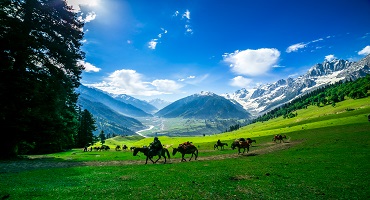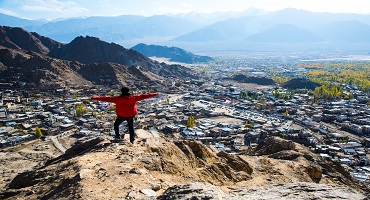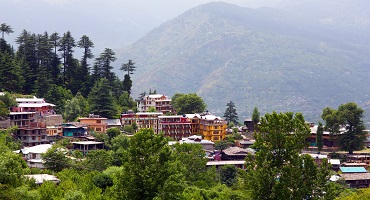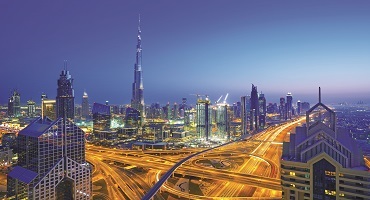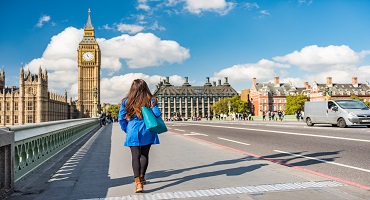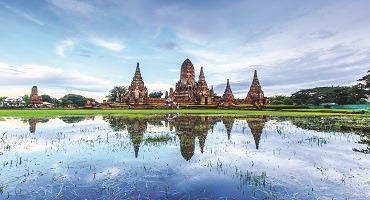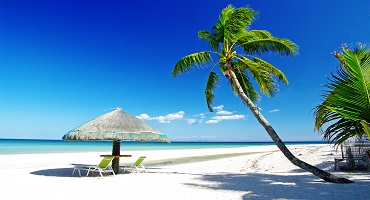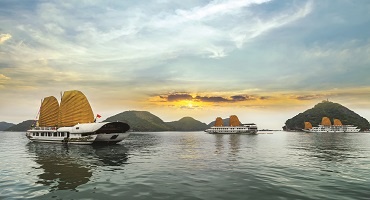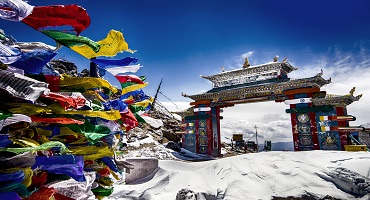The rolling green mountains cloaked in clouds kiss the sky while the misty valleys beckon you with a promise of adventure. Mount Abu rises out of these serene undulations like a shy bird peeking out of foliage. Rajasthan’s only hill station is a glorious holiday destination blessed with a rare beauty that shines brightly amidst the state’s arid magnificence.
The Dilwara Jain Temples with their intricate artwork and flawless architecture techniques stand testament to the region’s cultural diversity. The Achalgarh Fort has riveting tales to tell. The stunning views from the fort form the perfect backdrop for a lesson in Abu’s history. Trevor’s Tank will fascinate you with its collection of reptiles. The park itself is a teeming haven for bird watchers with a variety of species on display.
The Nakki Lake and the Mount Abu Wildlife Sanctuary are big tourist draws. Head to the Peace Park if you’re searching for peace amidst the mad hustle and bustle of this beautiful hill station. The breath-taking views from the Guru Shikhar Peak will give you memories of a lifetime. Mount Abu is full of treasures waiting to be unearthed. Mount Abu Tourism is indeed spectacular and is a must visit places
But, like all hilly wonders, Mount Abu’s weather can play truant with your itinerary. If you want to experience Mount Abu in its full glory, it is essential to know the right time to visit. Here’s a handy guide of the best time to visit Mount Abu.
Peak Season - In Mount Abu, November to February is considered to be the peak tourist season. Abu is alive with tourists. The hill station wears its best festive look to welcome visitors who flock in from all over India. This is Abu at its best!
Shoulder Season - Shoulder Season in Mount Abu lasts from March until June. While the beauty of Abu remains undiminished, it is free from the hordes of tourists. This is an ideal time to visit if you enjoy tropical summers with a healthy dose of tranquility.
Low Season - Between July and October Mount Abu sees intermittent rainfall and most tourist attractions like boating on Nakki Lake are closed for the season. This is a good time to visit to experience nature’s magic that comes alive with the rains.
| Travel Season |
Min./Max. Temperature |
Seasons |
| Winter |
16 - 22°C |
Cold and Plesant |
| Summer |
31 - 36°C |
Warm to Hot |
| monsoon |
28 - 34°C |
Intermittent Rainfall |
Mount Abu weather In Winter (November - February)
Temperature - The day temperature in Mount Abu ranges between 16 - 22°C. While it may go higher, it rarely exceeds 27°C. At night, Mount Abu's temperature can go as low as 10°C.
Weather - It doesn’t snow in Abu, but the entire hill station wears an emerald cloak to welcome its visitors. People from all over flock to the soothing weather in Mount Abu. Though it may get warm during the day, it never exceeds the comfort levels. The crisp early mornings and evenings are cooler than the rest of the day while the nights can get even colder. With no rains around, the weather in Mount Abu stays cool and dry, the perfect conditions to get your sightseeing done.
Significance - Mount Abu boasts a rich history that goes as far back as the 11th century. But it also finds a mention in the Puranas as Abudaranya. The architecture of the Jain Dilwara Temples and the Achalgarh Fort are beautiful examples of the respective periods’ style of construction.
Why you should visit now - This is the best season to be in Mount Abu and the cool weather offers perfect conditions for doing all your sightseeing without interruptions. You can spend the entire day in sampling Abu’s delights and top it off with a rejuvenating evening walk. The usual tourist haunts like the Nakki Lake, Sunset Point and Achalgarh Fort come alive with the excitement of its visitors.
If you’re in Mount Abu at the end of December, you can catch the annual Winter Festival which is a celebration of the local culture and hospitality. You can partake in the festivities which include events like dancing, musical performances, firework displays and kite flying. Those looking for adventure can enjoy zip-lining, rappelling and rock climbing at the Thrill Zone Adventure Park. There are really some amazing places to visit in Mount Abu ,so make sure to check it out
Things to know before the visit - Winter is a busy time in Mount Abu, so expect it to be crowded. You will find hotel rates to be higher than normal as this is the peak tourist season. Book your travel and accommodation well in advance to avoid getting stranded without a hotel. All the sightseeing and attractions will be open so you can experience the best Abu has to offer. Try to plan your trip towards the end of December so that you participate in the annual Winter Festival.
Tips - Pack heavy woolen clothes if you’re not used to the cold. But a light jacket or a pullover will be sufficient to get you through the day. Dress in layers so you can adjust better to the climatic conditions as the day progresses. Carry plenty of moisturizer and mosquito protection for the nights. Mount Abu has a fascinating history, so hire a knowledgeable guide who can give you the story behind the hill station’s old fort and monuments.
Mount Abu weather In Summer (March - June)
Temperature - The summers of Mount Abu are warmer than most hill stations owing to its location. Temperatures in Mount Abu during the day range between 31 - 36°C, but can soar to around 40°C. Nights are relatively cooler at around 28°C.
Weather - It rains sporadically in Mount Abu during summer, but it does nothing to alleviate the heat. Even though the weather stays on the warmer side, Abu sees a lot of visitors even during summer. The oppressive heat of the plains, coupled with school vacations, drives people to the mountains in large numbers. April and May see the peak of summer as Mount Abu's weather begins to cool down by June.
Significance - The heat of Mount Abu is not oppressive enough to play spoilsport with your itinerary. You can go sightseeing even during the day, provided you carry enough protection against the heat. Explore the markets in the evenings and you are sure to score good bargains.
Why you should visit now - Summer is a great time to take a break. Mount Abu affords you the chance to step back from the daily grind of life and take a relaxing break. This is a good season to explore the Mount Abu Wildlife Sanctuary. Visit Trevor’s Tank for an up and close encounter with crocodiles. The Government Museum and the Dadta Sea World Museum are great places to explore.
Things to know before the visit - In summer, you will find crowds everywhere in Mount Abu. Don’t be surprised if you find lines at most of the tourist attractions. Visit the indoor attractions like museums or the temples in the afternoon. The evenings would be more suited to outdoor explorations.
Tips - Abu summers are not excruciatingly hot. Carry light cotton clothes that will keep you comfortable. Carry a strong SPF 30+ sunscreen to protect against sunburn and tanning. Always keep a water bottle handy and avoid drinking water from unknown sources. If you confirm your bookings in advance, you may get some good deals on travel and hotel stays.
Mount Abu weather In Monsoon (July - October)
Temperature - Mount Abu temperature in monsoons stay between 28 - 34°C, occasionally dropping to 28°C. It rains intermittently during the day and the air is humid.
Weather - Though it rarely goes below 28°C, the rain makes it seem cooler. The evenings and nights are cooler than the day. Due to its proximity to the desert, Abu doesn’t receive torrential rainfall like most other hill stations. Abu’s verdant cover takes on a fresh look and all monuments appear to be alive after a refreshing shower.
Significance - Mount Abu, in monsoon, is an island of tranquility. With not many tourists around, you can enjoy the hill station at your leisure. The national park is teeming with wildlife and Abu itself takes on a relaxed aura.
Why you should visit now - Abu’s verdant cloak takes on a fresh look and all monuments appear refreshed after a cleansing shower. You will barely find any tourists at this time of the year and you may even have Abu to yourself. Long lazy walks and sampling of local delicacies is the order of the day. Abu’s fort and temples take on a solemn air in the absence of visitors as if meditating and reminiscing a bygone era. The fresh air spurs you on to explore and make the most of a crowd-free Abu.
Things to know before the visit - Monsoon is the low season in Abu. You will not find crowds and consequently, you may enjoy significant discounts on your travel and hotel stays. Even though it doesn’t rain heavily in Abu, untimely rain can hamper your sightseeing plans. So make sure you factor that in your daily plan.
Tips - Ensure that you pack your clothes in waterproof luggage. Carry your umbrellas and sturdy rain gear that will protect you from the elements. Gumboots and sandals are recommended over regular footwear as they will dry easily. Do not forget a good mosquito repellent. Be picky while choosing a place to eat and avoid eating roadside food.
Thomas Cook’s holiday packages are designed to showcase the best of Mount Abu. They will also take you off beaten paths for a unique perspective on a popular holiday destination. Drop into your nearest Thomas Cook branch or book your holiday online. So, have you decided the best time for your Abu vacation?! There are amazing Mount Abu Tour Packages to choose from, here at Thomas Cook. Also,check out more ways on How to reach Mount Abu

